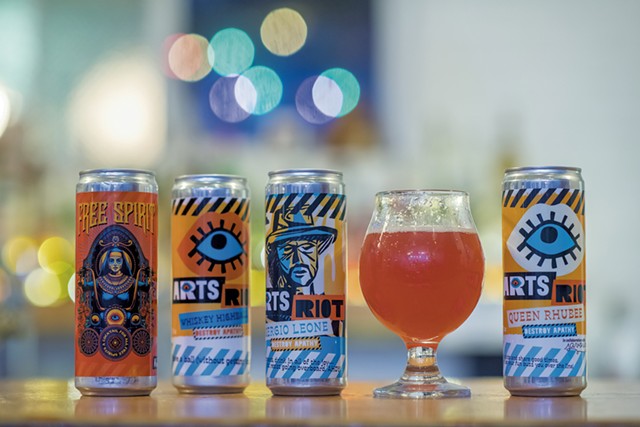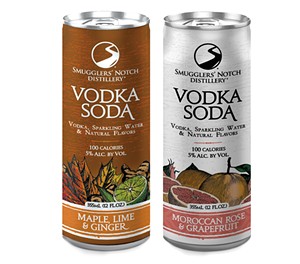Switch to the mobile version of this page.
Vermont's Independent Voice
- News
- Arts+Culture
- Home+Design
- Food
- Cannabis
- Music
- On Screen
- Events
- Jobs
- Obituaries
- Classifieds
- Personals
Browse News
Departments
Browse Arts + Culture
View All
local resources
Browse Food + Drink
View All
Browse Cannabis
View All
-
Business

Cannabis Company Could Lose License for Using…
-
Culture

'Cannasations' Podcaster Kris Brown Aims to 'Humanize'…
-
True 802

A Burlington Cannabis Shop Plans to Host…
-
Business

Judge Tosses Burlington Cannabiz Owner's Lawsuit
-
Health + Fitness

Vermont's Cannabis Nurse Hotline Answers Health Questions…
Browse Music
Browse On Screen
Browse Events
View All
Quick Links
Browse Classifieds
Browse Personals
-

If you're looking for "I Spys," dating or LTRs, this is your scene.
View Profiles
Special Reports
Pubs+More
Vermont Legislature Expands Market for Ready-to-Drink Spirits Beverages
Published June 7, 2022 at 3:14 p.m. | Updated December 20, 2022 at 4:36 p.m.
This story was updated at 5:25 p.m. on June 7, 2022.
After five years of product development and planning, Smugglers' Notch Distillery is set to flip the tab on its canned vodka sodas. And thanks to a bill recently passed by the Vermont legislature, the Jeffersonville-based distillery will have an expanded market for the ready-to-drink products.
The bill, H.730, creates a new category within Vermont's Title 7 statute, the state's liquor laws, for "ready to drink spirits beverages." Instead of controlling their distribution through the Vermont Department of Liquor and Lottery and limiting their sale to 79 state-contracted 802 Spirits stores, the bill allows spirits-based beverages that are 12 percent alcohol or less — and packaged in containers no greater than 24 fluid ounces — to be distributed by private-sector wholesalers and sold in the state's nearly 1,000 grocery stores, convenience stores and gas stations. It landed on Gov. Phil Scott's desk on June 1, and he signed it into law on Tuesday.
"The extra opportunity is going to be wonderful for brand awareness for us," said Smugglers' Notch president and co-owner Jeremy Elliott. "I launched my first product in 2010, so we're pretty well-known. But this is going to give us a greater opportunity to hit more consumers."
Smugglers' Notch originally planned to release two ready-to-drink vodka sodas — Maple, Lime & Ginger and Moroccan Rose & Grapefruit — in 2019. The company regrouped at the start of the pandemic, "then I was waiting for this legislation to go through," said Elliott, who is also president of the Distilled Spirits Council of Vermont. "We've been pushing for this for a while, and it's taken a lot of sweat to get here."
Four-packs of the 5 percent alcohol, 12-ounce sleek cans are scheduled to arrive on grocery store shelves in the first or second week of July, Elliott said.
The bill's passage is the culmination of three years of legislative work to carve the growing category of ready-to-drink beverages out of the Department of Liquor and Lottery's control. The state's distillers, beverage wholesalers and other advocates sought parity with beer and wine — which are sold through the private sector — for spirits-based products with similar alcohol content.
For Rep. Matt Birong (D-Vergennes), it's all about modernizing Vermont's prohibition-era liquor laws in a way that supports the state's producers.
"I believe our distillers are going to do very similar things to what our brewers have done and create really cool, unique products with a local focus and flair," Birong said.
While other control states have made a similar move to reclassify spirits-based ready-to-drink beverages, Vermont is among the first to reduce excise taxes on the category, Birong said. Rather than tax them as spirits — currently $7.68 per gallon — ready-to-drink spirits beverages will be taxed at $1.10 per gallon.
The rate is still higher than the tax on beer and wine, but the move to lower it caught the attention of lobbyists representing Big Beer, who considered the proposal a threat to their products' market share. Many of the country's largest beer producers have jumped into the hard seltzer market in recent years. Those malt-based beverages are allowed on Vermont grocery store shelves. The beer industry believed spirits-based drinks were a direct competitor, occupying shelf space traditionally given to their products.
"They were vehemently opposed to this moving forward at all," Birong said.
The change doesn't apply to takeout cocktails, which restaurants and bars are allowed to sell through July 2023, thanks to a two-year extension of Gov. Phil Scott's March 2020 executive order.
Instead, the new definition refers to the growing category of spirits-based, single-serve, ready-to-drink packaged products, often called "RTDs." The RTD market is dominated by national canned-cocktail brands such as High Noon, which sells vodka-based hard seltzer, and Cutwater Spirits, which offers an array of tequila, vodka, rum, whiskey and gin cocktails.
"Even though it's a fast-growing category, the scope of it is very small compared to our total sales volume," said Wendy Knight, Commissioner of the Vermont Department of Liquor and Lottery. Roughly 70 low-alcohol RTD products are for sale in Vermont, Knight said, though she expects new ones to hit the market, now that the law has changed.
"There are a number of Vermont distillers that have these products and that were developing these products during the session," Knight said, including SILO Distillery, Black Flannel Distilling and the soon-to-open ArtsRiot distillery. "And I know that a lot of others were waiting to see, because this obviously opens the market tremendously," she added.
Not all spirit-based ready-to-drink products will leave 802 Spirits stores when the law goes into effect in July. Mad River Distillers' bottled cocktails — including a new Maple Fig Madhattan made with the distillery's Maple Cask Rum and Black Fig Vodka from Black Infusions — are each at least 33 percent alcohol.
"They're way above the [12-percent] limit," Mad River Distillers president Mimi Buttenheim said.
Mad River doesn't have products in the works that would fit the new definition, Buttenheim said, but she's not ruling it out. For now, as lower-alcohol cans leave the relatively small ready-to-drink sections of state-contracted liquor stores, she sees more room for the distillery's booze-forward cocktail products.
"Everything is going to look more similar and make more sense for consumers," Buttenheim said. "I think it's great for Vermont."
The legislature considered a similar redefinition of fortified wine to allow it to be sold in grocery and convenience stores. But that change — as well as a proposal to allow Vermont distillers to ship their products directly to consumers — failed to make it into the final bill.
The bill does create a definition for cider — to give the category its own clear identity and to update how ciders are taxed, starting in July 2023. It also allocates $50,000 from the general assembly to the state Agency of Administration to conduct a third-party study "concerning the potential privatization of Vermont's alcoholic beverage market" by 2024.
It's not the first time Vermont has evaluated its control-state model, Commissioner Knight said. "It's helpful for policymakers and legislators and regulators to periodically identify whether or not the systems are working, and who they benefit," Knight said. "It's always good to ask questions and reevaluate."
The original print version of this article was headlined "Ready to Go"
Related Locations
-
ArtsRiot
- 400 Pine St., Burlington Burlington VT 05401
- 44.46810;-73.21474
-
 802-540-0406
802-540-0406
- www.artsriot.com…
-
Black Flannel Brewing & Distilling
- 21 Essex Way, Suite 201, Essex Chittenden County VT 05452
- 44.50675;-73.08240
-
 802-857-5629
802-857-5629
- blackflannel.com
-
Mad River Distillers
- 89 Mad River Green, Mad River Taste Place, Waitsfield Mad River Valley/Waterbury VT 05673
- 44.18426;-72.83829
-
 802-496-6973
802-496-6973
- www.madriverdistillers.com…
-
SILO Distillery
- 3 Artisans Way, Windsor Upper Valley VT 05089
- 43.51438;-72.40216
-
 802-674-4220
802-674-4220
- www.silodistillery.com
-
Smugglers' Notch Distillery
- 5087 Route 15, Jeffersonville Stowe/Smuggs VT 05464
- 44.64740;-72.82872
-
 802-309-3077
802-309-3077
- www.smugglersnotchdistillery.com
Related Stories
Got something to say?
Send a letter to the editor
and we'll publish your feedback in print!
Tags: Food + Drink Features, liquor, ready-to-drink spirits, spirits, cocktails, canned cocktails, Smugglers' Notch Distillery, Smugglers' Notch Distillery (Barrel House Tasting Room), SILO Distillery, ArtsRiot, Mad River Distillers, Black Flannel Brewing Co.
More By This Author
About The Author

Jordan Barry
Bio:
Jordan Barry is a food writer at Seven Days. She holds a master’s degree in food studies and previously produced podcasts about bread and beverages.
Jordan Barry is a food writer at Seven Days. She holds a master’s degree in food studies and previously produced podcasts about bread and beverages.
Speaking of...
-

Three to Six Hours in Windsor
Jun 19, 2024 -

On the Beat: Music Returns to ArtsRiot, Grace Potter Launches the Grand Point Foundation
Jun 5, 2024 -

Ondis Serves Seasonal Fare With a Side of Community in Montpelier
Apr 16, 2024 -

Low Bar to Open in Vergennes
Oct 18, 2023 -

Crumbs: ArtsRiot Space for Lease; Jones the Boy Closes Bristol Retail Bakery; 'Seven Days' Makes Late-Night TV
Oct 18, 2023 - More »
Comments
Comments are closed.
From 2014-2020, Seven Days allowed readers to comment on all stories posted on our website. While we've appreciated the suggestions and insights, right now Seven Days is prioritizing our core mission — producing high-quality, responsible local journalism — over moderating online debates between readers.
To criticize, correct or praise our reporting, please send us a letter to the editor or send us a tip. We’ll check it out and report the results.
Online comments may return when we have better tech tools for managing them. Thanks for reading.
- 1. Haymaker Bun’s New Burlington Café Packs a Punch Food + Drink Features
- 2. Jr's Williston Closes; Jr's Winooski Remains Open Under Different Owners Food News
- 3. Vermont Comedy Club Chef Mo AlDoukhi Cracks Eggs and Jokes Grilling the Chef
- 4. Creemee Confidential: What It Takes to Create Vermont’s Treasured Summer Treat Food + Drink Features
- 5. Small Pleasures: Burlington's Odd Otter Ice Cream Mixes High-Quality Dairy With Inventive Flavors Small Pleasures
- 6. Flood-Damaged Miss Lyndonville Diner Will Not Reopen Food News
- 7. Charlotte's Former Nordic Farm Has New Owners Food News
- 1. Creemee Confidential: What It Takes to Create Vermont’s Treasured Summer Treat Food + Drink Features
- 2. From Brioche to Biscotti, King Arthur Hotline Backs Bakers Food + Drink Features
- 3. Vermont Health Officials Prepare for Bird Flu as It Spreads in Dairy Herds News
- 4. What Vermont’s Classic American Diners Tell Us About the Current State of Restaurants Food + Drink Features
- 5. Manhattan Pizza & Pub Staff Walk Out Amid Conflict With Owner Food News
- 6. Gold Restaurant to Open in Burlington's Old North End Food News
- 7. East Middlebury's Historic Waybury Inn Changes Hands Food News









































